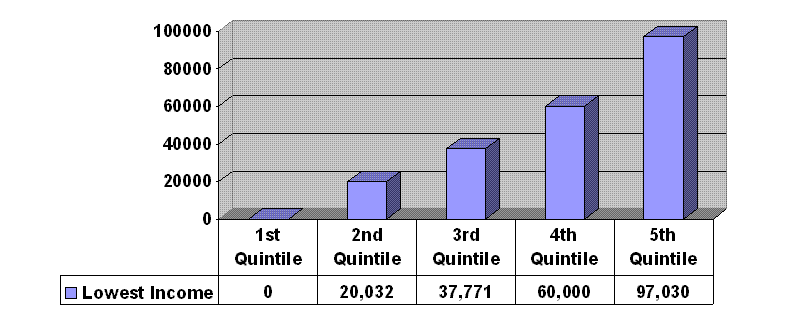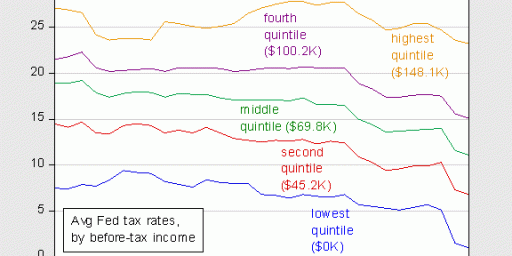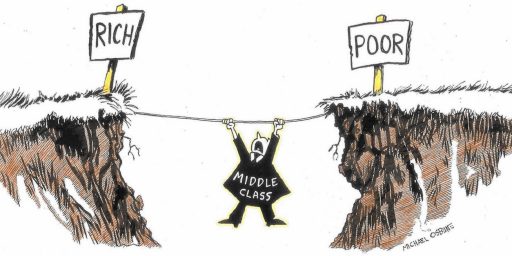Defining ‘Middle Class’
Dave Schuler, commenting on last night’s Democratic debate, observes:
Sens. Clinton and Obama used different definitions of “the middle class” in answer to Charlie Gibson’s attempt to extract from them a “no new taxes” on the middle class from them. Hillary Clinton defined the middle class as families earning an income lower than $250,000, a definition with which I’d agree. Basically, that’s all but the top 1% of income earners. Sen. Obama’s definition was families earning an income below $75,000. I think that’s an extremely narrow definition. It doesn’t even include all of the fourth quintile who to me are obviously middle class.
If by middle class, you mean “those in the middle three quintiles,” then Obama’s definition is probably closest. If, though, you mean “not poor but not rich, either,” then Clinton’s measure is closer.

(2007 Census Bureau Figures)
It might seem absurd to include much of the fifth quintile in the definition of middle class. After all, they’re certainly not actually in the middle. But a family making $75,000 is barely making ends meet in some of our major metropolitan areas. If “middle class” means you’re working for a living, live on a budget, have to think about making major purchases, and such, then $75,000 certainly qualifies.
Now, $250,000 is probably stretching it. Even in Manhattan, LA, Boston, and DC, you’re living pretty nicely on a quarter mil. But you’re probably just upper middle class. That is, you don’t have servants, a yacht, and a Ferrari even at that income level.
Virtually none of Dave commenters agree, interestingly. Most likely, that’s because most people probably define rich as those making substantially more than they do.





When I said “too narrow” I specifically meant that it didn’t include the eighth decile.
But there are other problems with defining the “middle class” as the middle three quintiles. For example, longshoremen can make enough to put them into the ninth decile. Doesn’t a definition of “the rich” or the “upper class” that includes longshoremen strain credibility?
I have nothing whatever against people who labor for a living; it’s an honorable way to earn your daily bread. But I don’t believe it’s what we think of when we say “the upper class”.
Agreed. A longshoreman who’s making $150,000 a year is making some pretty good money. But he’s by no means wealthy. If he wrenches his back, he can be in financial trouble mighty quick.
Since they were both using the term as part of campaign rhetoric it really doesn’t matter what definition they or we use. Middle class, working class, whatever, it all means something different to each voter and therefore gets a lot of mileage on the stump.
We don’t get real policy details during the campaign and what the next president wants he may not get through congress so what do details matter at this point? I wish we voted on the mundane things like policy but the fact is we vote more about looks and charisma.
By JJ’s definition, *most Americans* are “barely making ends meet.”
This, in the wealthiest country that has ever existed.
Bit of a problem, isn’t it?
The average salary of a Boston cop is 89k, a nurse with a couple of years of experience can make about 80k. Nurse married to a cop 169k.
Cop and nurse, seems pretty middle class to me.
I think it’s also important what your money will buy you. I’m employed by a client on the east coast and living right in the middle of the midwest. If I suddenly had to relocate to the east coast to keep this job (won’t happen, thankfully), then my buying power takes a big, big dip.
If I move out of the city I’m in now and into a rural area, my buying power increases quite a bit. This scenario – where income is fixed because the job is “virtual” isn’t all that odd these days, and I think it’ll become more prevalent.
A raw number like $250,000 doesn’t really mean squat in a family’s standard of living, which is what the “class” structure is really about.
No, not at all. A family making $75,000 in much of the country is likely doing quite well for themselves. But, as Heather notes, if they move to Boston or LA or NYC, they’d be struggling on that.
My point is that a family making $80,000 is probably not “rich” in most of the country. Some places, they’re on the lower end of middle class; most places, they’re toward the higher end. In only a handful of places are they even going to be “upper middle class.”
It is an old point, but again, wealth and “richness” have more to do with assets than income. After many years, I have a high income, but not a lot of assets. Should I be taxed for earning money at the same rate as someone who gets an equivalent amount of their money as interest and dividends from their accumulated wealth? Actually, I think I’d like to be because right now I believe I am taxed more.
James nails it when he says at the end that most people define upper class as people who are much richer than them.
Let’s not forget why Democrats ask this question. They are asking who should have the biggest tax increases. The answer to that question should be the middle class, which is vastly undertaxed for the services they demand through the people they elect. If the middle class, which decides every election, was forced to actually pay their share of a balanced budget, wasteful government spending might slow down in a hurry. It is pathetic that people who only pay a few thousand a year in taxes whine about tax cuts “given” to people who still pay six figures or more in taxes, while demanding tax cuts for themselves even as the country runs a massive deficit. But that sort of live for the moment, irresponsible selfishness is basically the hallmark of Boomer and post-Boomer America, red and blue. Or am I wrong?